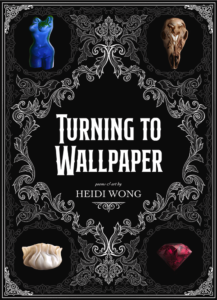 Wow, this book is a gut punch, in several very excellent ways.
Wow, this book is a gut punch, in several very excellent ways.
First, ofc, there’s the art, all by Heidi Wong, which is primarily dark to macabre. My review copy was a black and white Kindle version, so there’s only so much I can say about something I can’t observe in its full glory, but the renditions I had available to me were striking and invited long scrutiny (and it’s easy to tell from the cover photo I included here alone that I definitely missed out on the vibrancy of her use of color.) While much of the art was a bit too lushly Gothic for my personal taste, it did compliment the text quite well. My favorite pieces were the ones that combined Tarot imagery with the use of social media, two of my most recent preoccupations.
Perhaps unsurprisingly, the poetry in the book also spoke to issues that have been in my head for this last longest while. Dealing with topics of family, illness, immigration, alienation, death and sexual assault via imagery courtesy of Shakespeare and Ovid, the rawness of the emotions is for the most part cleverly, impactfully channeled through Ms Wong’s intelligent use of wordcraft and construction. Our Story, Told In The Wrong Order is a particular favorite, tho I’m hoping it’s less confessional than metaphorical! Another of my favorite poems of this collection, After The Breakup, is particularly impactful for its dissonant ending. I loved the callbacks to and correlation between Lavinia and Philomela throughout.
But the overall very good construction of the poetry and art was somewhat dampened by the lack of arrangement in the volume itself. The poems would have felt more impactful had they been grouped thematically, where repetitions of phrase might have served a theme. Instead, the scattered references made it all feel a bit same-y.
This collection is also at its strongest when not tying itself too closely to a particular setting. Amorphous dreams of New York City and Victoria Harbor work much better than the name checks of towns so small as to carry no cultural weight, which is then compounded by a complete lack of setting description. Better that these faceless places also remain nameless, so the mind doesn’t try and fail to construct specificity out of nothing. Maybe that’s just me, but my brain was completely thrown out of my immersive enjoyment of the poems by wondering where and what a Milbank or Kirkland were and signified (and once a chagrin at realizing that defaulting to Saint Petersburg being in Russia was perhaps not the obvious choice for interpretation here.) I get that these names mean something to the author, but the point of publishing poetry is to connect, to share meaning, to create for these words a weight and importance. Name checking only works if the name belongs to something consequential to the reader. In lieu of that, give me at least the bare bones sketch of these nowhere places so I understand what you’re trying to make me feel.
Easier to construct specificity — and universality! — out of human emotions and situations. Even the obscure gods and myths invoked conjured a fresh layer on the poems they were attached to, simply by having a pre-existing cultural personality known arguably to millions through time worldwide. Ms Wong is deeply talented. Especially given her own predisposition to elegant construction, I believe she’d benefit from working with a poetry editor who’d push back on the intrinsic poetic inclination to excess and sprawl, in much the way a city planner can aid an architect’s vision so that the end result is closer to harmonious marvel than impenetrable chaos. Turning To Wallpaper definitely leans towards the former, but could use a little more help to get all the way there.
Turning To Wallpaper by Heidi Wong was published September 28 2021 and is available from all good booksellers, including
